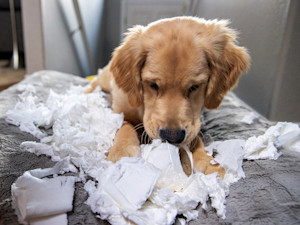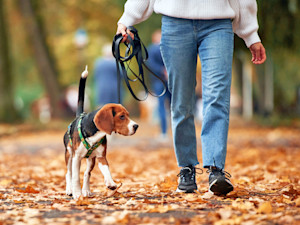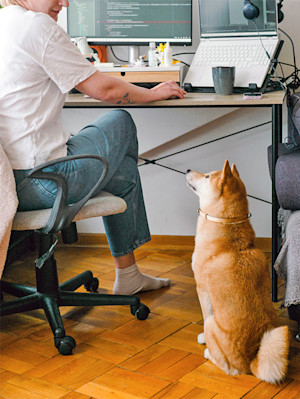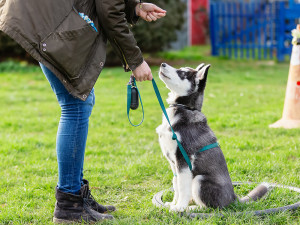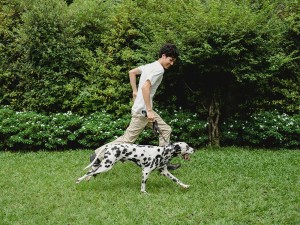Why Do Dogs Bury Bones?
They sure love to make craters in your backyard.

Share Article
In This Article:
Why Do Dogs Bury Bones? The History of Burying Behavior Should You Let Your Dog Bury Bones? H ow to Stop Your Dog From Burying Bones Frequently Asked Questions
Every time my dog, Lilac, gets a new bone, she buries it right away. Watching her dig a hole is almost worth the money I spent on the bone itself. She carefully places the bone inside the hole, nudging the dirt over it with her nose. She does all this with an air of solemnity, mostly in the soft soil around the base of plants. If it’s cold, she’ll dig a shallow hole in the decomposing brown leaves at the edge of the woods and cover the bone with leaves. Months later, she retrieves the partially decomposed prize.
Veterinarian Dr. Marc Smith, owner of Natchez Trace Veterinary Servicesopens in new tab, says dogs are highly instinctual creatures, despite centuries of domestication and their reliance on us. Their close relatives, wolves, often bury their food to protect it from scavengers.
“Your dog might bury its bones based off genetically instinctual behaviors,” Smith says. “Although your dog probably does not have scavengers looking to steal its precious bone, this instinct still lies within them.”
The bone in question might instead be a treat, a toy or coveted chew. Kinship has a guide to the safest optionsopens in new tab (spoiler alert: it’s pig ears and bully sticks). There’s also advice about what types of bones are safe for puppiesopens in new tab and why it’s never safe for dogs of any age to have rib bonesopens in new tab.

Why do dogs bury bones?
Instinctual behavior
Dr. Aimee Warner, resident veterinarian at Waggelopens in new tab, says a dog’s instinct to bury bones is a behavioral tendency inherited from their wild ancestors. “Wild canines used to cache food for future consumption, particularly when food was not always available,” Warner says, adding the urge remains particularly strong in hunting and guard dogs. “It’s a survival mechanism for them. Some still do it now, even in the house — by ‘digging’ on the carpet or pushing imaginary dirt onto a toy or treat. It’s such a great demonstration of instinct.”
Resource guarding
Resource guarding is defined as your dog’s protective behavior toward food or a toy it fears another animal might steal. My first dog, Grendel, would attack other dogs for approaching her toy or take another dog’s toy and growl at them if they tried to get it back. “Resource guarding can happen in many different ways, sometimes burying bones and sometimes even in the form of aggression,” Smith says. “If your dog is burying their bones as a form of resource guarding, your dog is trying to hide its bone [to keep it] from being stolen.”
Entertainment or boredom
Digging and hiding are stimulating, sensory behaviors that entertain dogs, Warner says. Garden soil, couches and clothes baskets are ripe for exploring. Digging a large hole in the garden is one of many things dogs do for entertainment, Smith says. “Sometimes dogs will bury their bones to stimulate themselves,” he says. “This could be due to them being bored and not having a good source to put their energy into.”
Anxiety or stress relief
Warner explains that digging can be a symptom of anxiety and stres s, like boredom. “Burying is an anxiety/stress-relieving mechanism in some canines, particularly under routine or situational stress,” she says.
Environmental factors
Terriers and Dachshunds are among the dogs bred to hunt underground animals like gophers who were threatening farmers’ crops. They’re so good at digging that the American Kennel Club (AKC) developed Earthdogopens in new tab, a simulated sport for underground hunting dogs. In the absence of activity that speaks to their deepest instincts, dogs will dig vigorously in soft, yielding soil or bedding to soothe themselves. “Sometimes, dogs just need a sense of security to make them relax,’ Smith says.
The historical roots of burying behavior
Understanding the roots of your dog’s behavior can help you appreciate their connection to history.
Imagine a hole in the ground as a refrigerator for your dog’s ancestors. Like us, your dog’s wolfish forbearers appreciated a consistent food supply. Within canine evolutionary history, burying is a wolf’s deeply rooted solution to a persistent problem.
“Burying their excess food allows them to have food whenever they need it,” Smith explains. “They also live in the wild, thus leaving food out and about will attract all sorts of scavengers to come and steal their excess food.”
Should you let your dog bury bones?
If your pup’s digging is sporadic and doesn’t damage your yard or home, it’s generally harmless, Warner says. “If your dog is having some small bury-and-dig nirvana and is not ruining furniture, soiling beds or being overly possessive, then it’s fine,” she says.
Smith agrees and says it depends on your tolerance. “Generally, the only reason to stop this behavior is if it is harmful to you,” he says. He cautions that digging can lead to more destructive behaviors. “For example, this urge to dig in the yard could suddenly turn into an urge to dig a hole in your couch,” he says.
How to stop your dog from burying bones
Provide mental and physical stimulation.
A tired dog doesn’t have the energy to dig. Warner advises making sure your dog is well-exercised mentally and physically. If burying bones is a form of mental stimulation, Smith suggests trying a toy that was made to stimulate digging behavior. These snuffle mats could be a great option to curb your dog's destructive behavior while still giving their energy an outlet, he says.
Limit access to bones.
Observe what items your dog likes to bury. My dogs, for example will bury bones and chews but not treats and toys. “Sometimes the best way to eliminate a problem is to start at the root of the problem,” Smith says. “If your dog is only digging around their bones, removing the bones does not give the dog a chance to exhibit that behavior.”
Redirect the behavior with toys or chews.
Sometimes digging is the symptom of abundant energy that can find another outlet. Give your dog an engaging chew or toy. Smith mentions toys that are designed to stimulate a dog’s desire to dig. “These dig mats can be filled with treats making the dog want to dig and helping to get out that desire,” he says.
Create a designated digging area.
Dogs are infamous diggers, bones or not. I still find (and narrowly avoid) holes my dogs dig looking for mice in the fields around our house. Training your dog not to dig is possible if you’d rather not twist your ankle walking through your own yard. Warner suggests providing them with a sandbox or garden bed to place objects and bury. If encouraged, they’ll likely return to that area. “If your dog is having a hard time curbing the urge to dig, sometimes a compromise is a great choice,” Smith says. “By redirecting this behavior to one specific location, it can be easier to control and manage.”
Consult a veterinarian or trainer for behavioral concerns.
If the behavior seems obsessive, is destructive or impossible to redirect, Smith advises meeting with a veterinarian or behaviorist to unearth (no pun intended) the cause. “The best way to deter the behavior is to first discover why your pet does this,” he says. “If you can discover the why, you can then figure out how to stimulate your dog in a way that deters the digging behavior.”
FAQs
Why does my dog bury his bones in my bed?
Dog bury bones and toys out of instinct to protect or save those items for (in their minds) times of scarcity. Their first instinct might be to dig outdoors but, failing that, the pillows and blankets on your bed are soft, yielding and familiar.
Is it bad for dogs to bury bones?
No, not if you don’t mind your dog digging a hole to bury the bone. Much of canine behavior that mystifies us comes from deeply instinctual places. Some dogs were bred to dig (think terriers) and it’s in their genes.
Do all dogs bury bones?
Some are more likely to dig than others. Terriers, Dachshunds, Beagles, Schnauzers, and Border Collies are among the high-energy working dogs bred to dig for small animals. Huskies dig to keep themselves cool.
How can I stop my dog from burying bones?
Strategies include limiting access to bones, fencing off favorite excavation areas, redirecting the behavior or creating a designated digging area.
References
“Why do dogs bury bones?” SPCA New Zealand, Dr. Jess Beer, https://www.spca.nz/advice-and-welfare/article/why-do-dogs-bury-bonesopens in new tab
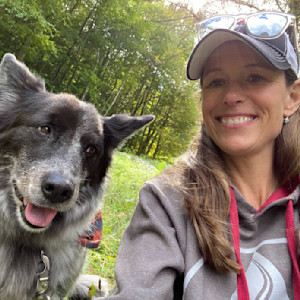
Catherine Fahy Green
Catherine Fahy Green is a journalist turned copy and content writer. As a pets writer, she focuses on and is fascinated by animal body language because there's so much to learn from and about animals by spending time in their presence and observing their physical cues.
Her work as a PR specialist appears in national trade media as press releases and stories about exciting new products people should try. She lives with her family in Western Massachusetts, where she listens closely to the stories her two dogs, flock of chickens, and four horses tell her. She spends her weekends at horse shows with her daughter.
Related articles
![Labrador Retriever puppy destroying toilet paper at home.]()
6 Behavioral Issues Your Dog Will Actually Grow Out Of—We Promise
Don’t panic—there is hope.
![Cute Beagle dog being walking outside in the park.]()
6 Hacks to Prevent Your Dog’s Problematic Behavior Before It Even Starts
Keep your dog from pulling on their leash, counter surfing, stealing socks, and more.
![Cute Shiba Inu dog staring at owner to get their attention.]()
7 Ways to Get Your Dog to Stop Doing Something Naughty without Saying “No”
It’s a reflex to yell “no,” but it’s not the best option.
![Woman trains with a young husky on a dog training field]()
How to Find a Qualified Trainer for Your New Dog
The questions to ask and credentials to look out for to find the right trainer for your dog, according to a pro.
![Man running with dalmatian dog on a leash in a backyard with grass]()
An Active Dog Is a Well-Behaved Dog
Why regular exercise can mean a less destructive dog and a happier you.
